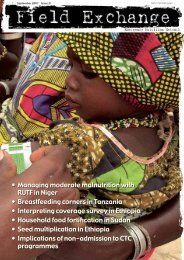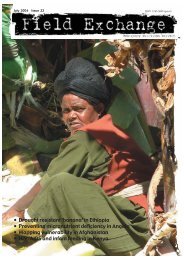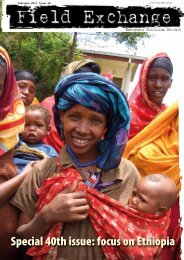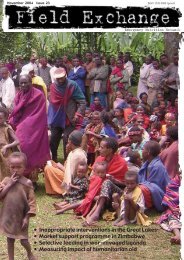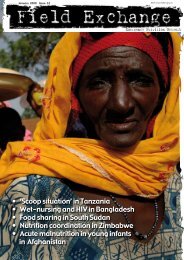Download PDF - Field Exchange - Emergency Nutrition Network
Download PDF - Field Exchange - Emergency Nutrition Network
Download PDF - Field Exchange - Emergency Nutrition Network
Create successful ePaper yourself
Turn your PDF publications into a flip-book with our unique Google optimized e-Paper software.
News &Views<br />
The focus needs to be on improving ‘nutrition literacy’ in<br />
a broad range of professions from nutrition to food<br />
security specialists, and agricultural staff social sector<br />
workers.<br />
to sustain initiatives. A system of certification<br />
for nutrition in emergency training courses<br />
recognised by both academic institutions and<br />
operational agencies would help to keep the<br />
quality of training high.<br />
5. Practical experience and internships<br />
Linking classroom-based learning with practical<br />
experience was agreed to be essential in<br />
emergency nutrition training.<br />
6. Trainers<br />
A cadre of good trainers in nutrition in emergencies<br />
is essential. Trainers may not necessarily<br />
be technical experts. However, it will be<br />
hugely advantageous if trainers have some<br />
level of practical experience and understand the<br />
realities of emergency contexts.<br />
7. Sustainability<br />
Many training initiatives have failed in the past<br />
because they were not sustained. In some cases<br />
this was due to lack of funding but more<br />
commonly, it was due to a lack of appropriate<br />
trainers on hand to do the training and a lack of<br />
commitment by participating agencies. One<br />
way of ensuring financial and political sustainability<br />
will be through developing business<br />
models that are able to ensure adequate income<br />
from funding and/or student fees, while maintaining<br />
commitment from within the training<br />
institution.<br />
8. Advocacy<br />
Good advocacy was viewed as the essential<br />
element to successful nutrition in emergencies<br />
training. Advocacy is needed at global level,<br />
regional and national level. A series of steps<br />
should be followed to develop a successful<br />
advocacy plan, the first of which is documenting<br />
the evidence. For example, there is a<br />
common view that there are not enough people<br />
with emergency nutrition and related skills<br />
available, especially ‘national’ staff, but there<br />
has been no attempt to document and analyse<br />
this gap. An ‘audit’ of staff that could be<br />
deployed in an emergency with nutritionrelated<br />
skills would be useful. In addition to this<br />
quantitative evidence, qualitative information,<br />
such as case studies of particular emergencies<br />
and real-time evaluations, would be useful in<br />
understanding where the gaps in capacity are.<br />
An urgent need was identified for the<br />
creation of a web based searchable register of<br />
staff with relevant skills. Creation of this register<br />
would also contribute to the audit of the<br />
‘capacity gap’. This type of analysis fits within<br />
the Global <strong>Nutrition</strong> Cluster capacity development<br />
strategy objectives.<br />
9. Evaluation/quality control<br />
Evaluating the process and outputs achieved by<br />
training initiatives will be very important in<br />
order to ensure that the quality achieved is<br />
good enough to meet the needs for professional<br />
competence identified by employers and<br />
others.<br />
“We’re finding it increasingly difficult to recruit good<br />
quality emergency food security and livelihoods people<br />
and I’m not sure if there are less people with a public<br />
nutrition background out there or whether they don’t<br />
want to work for our organisation!”<br />
Humanitarian agency staff member, November 2008<br />
Figure 1: Proposed structure for the <strong>Nutrition</strong> in Emergencies Training <strong>Network</strong> (NIETN)<br />
National initiatives<br />
Existing <strong>Network</strong>s<br />
e.g. PHCE<br />
The way forward<br />
Global <strong>Nutrition</strong> Cluster is currently looking at<br />
the appropriate institution for hosting an interactive<br />
website for the HTP. Once established,<br />
this will provide an ideal opportunity to<br />
expand and obtain feedback on the HTP and<br />
institutionalise monitoring of the HTP. Specific<br />
recommendations were made by the workshop<br />
participants in relation to dissemination of the<br />
HTP as follows:<br />
1. There is a need to translate the HTP if wide<br />
spread use is to be achieved. The Global<br />
<strong>Nutrition</strong> Cluster Capacity Development<br />
Working Group (CDWG) has committed to<br />
translating the HTP into French and Arabic.<br />
Portuguese was identified as another<br />
priority language.<br />
2. To help ensure widespread use, the HTP<br />
needs graphic layout to be completed for all<br />
modules.<br />
3. Some paper copies of the HTP may be<br />
needed because of difficulties with internet<br />
access and downloading large files.<br />
Proposal for a <strong>Nutrition</strong> in Emergencies<br />
Training <strong>Network</strong><br />
There was discussion around the concept of a<br />
<strong>Nutrition</strong> in Emergencies Training <strong>Network</strong><br />
(NIETN) and how it would look (See Figure 1).<br />
It was suggested that the network was an affiliation<br />
of four key partners encompassing<br />
universities and training institutions, humanitarian<br />
agencies, government bodies and other<br />
interested agencies, including the Global<br />
<strong>Nutrition</strong> Cluster and donors. The overall goal<br />
of the network would be to improve training in<br />
nutrition in emergencies. The network would<br />
be managed by a coordinating group that<br />
would initially be tasked with developing funding<br />
proposals to carry out key activities. A<br />
proposal for the <strong>Network</strong> has been written by<br />
<strong>Nutrition</strong>Works. It is envisaged that in early<br />
2009, a first meeting of the network will be held<br />
and proposals will be produced for network<br />
activities.<br />
1<br />
The full report is available from:<br />
http://www.humanitarianreform.org, click <strong>Nutrition</strong><br />
2<br />
The workshop was the initiative of the UNICEF-led Global<br />
<strong>Nutrition</strong> Cluster and was organised on their behalf by<br />
<strong>Nutrition</strong>Works, in association with the Centre for<br />
International Health and Development, University College<br />
London. The workshop is part of a broader emergency nutrition<br />
capacity development strategy being implemented by the<br />
Global <strong>Nutrition</strong> Cluster Capacity Development Working<br />
Group.<br />
3<br />
<strong>Nutrition</strong>Works is a UK based partnership of international<br />
nutritionists with expertise in emergency nutrition and capacity<br />
building.<br />
4<br />
These can be obtained from Carmel Dolan or Fiona Watson:<br />
see end of document for contact details.<br />
NIE Training <strong>Network</strong><br />
Operational<br />
Agencies<br />
Government<br />
Secretariat<br />
Universities<br />
Global <strong>Nutrition</strong><br />
Cluster and others<br />
Outputs<br />
Improved NIE training at 3 levels:<br />
National<br />
Regional<br />
Global<br />
Box 1: The Harmonised Training Package (HTP)<br />
The HTP was produced over a 1.5 year period by<br />
<strong>Nutrition</strong>Works and a number of authors and is a<br />
unique and comprehensive set of materials on nutrition<br />
in emergencies comprising 21 modules, which<br />
cover different technical areas. The HTP is a package<br />
of training materials but is not a ready to use course.<br />
Adaptation is required to create courses targeted at<br />
different audiences in different countries. The<br />
modules are designed to be used to develop stand<br />
alone, focused short courses and comprehensive<br />
nutrition in emergencies training courses and can<br />
also be used for advocacy.<br />
The HTP has been piloted and evaluated by Valid<br />
International and is now in the public domain. It can<br />
be used by any agency or institution. To download<br />
the HTP, go to: http://www.humanitarianreform.org,<br />
click on <strong>Nutrition</strong>, and see under ‘<strong>Nutrition</strong> Cluster<br />
Products’.<br />
Box 2: Consensus statement<br />
The participants of this workshop agree that:<br />
1. Capacity to respond to nutrition problems arising<br />
in emergencies is currently inadequate.<br />
2. There are very few nutrition in emergencies<br />
training opportunities, notably in developing<br />
countries.<br />
3. There is an imperative to improve nutrition in<br />
emergencies training in order to fill the gap in<br />
capacity to respond effectively to nutrition<br />
problems that arise in emergencies.<br />
4. The harmonised training package (HTP),<br />
developed by <strong>Nutrition</strong>Works under the auspices<br />
of the IASC Global <strong>Nutrition</strong> Cluster, represents a<br />
significant step forward in facilitating improved<br />
training. The workshop participants encourage its<br />
widespread use.<br />
5. There are immediate opportunities to improve<br />
nutrition in emergency training at international,<br />
regional and national level, using the materials of<br />
the HTP, through:<br />
a. training networks (such as the Public Health in<br />
Complex <strong>Emergency</strong> network) that can introduce<br />
emergency nutrition training short<br />
courses.<br />
b. university nutrition and public health degree<br />
courses<br />
c. diploma level training run by technical colleges<br />
d. in-service training.<br />
6. A new <strong>Nutrition</strong> in Emergencies Training <strong>Network</strong><br />
should be formed with the objective of increasing<br />
capacity to provide effective response to the<br />
nutritional problems arising in emergencies.<br />
7. The Secretariat (contingent on seed funding) will<br />
develop a number of concept notes focusing on<br />
advocacy, and developing and implementing<br />
courses in emergency nutrition training.<br />
20



